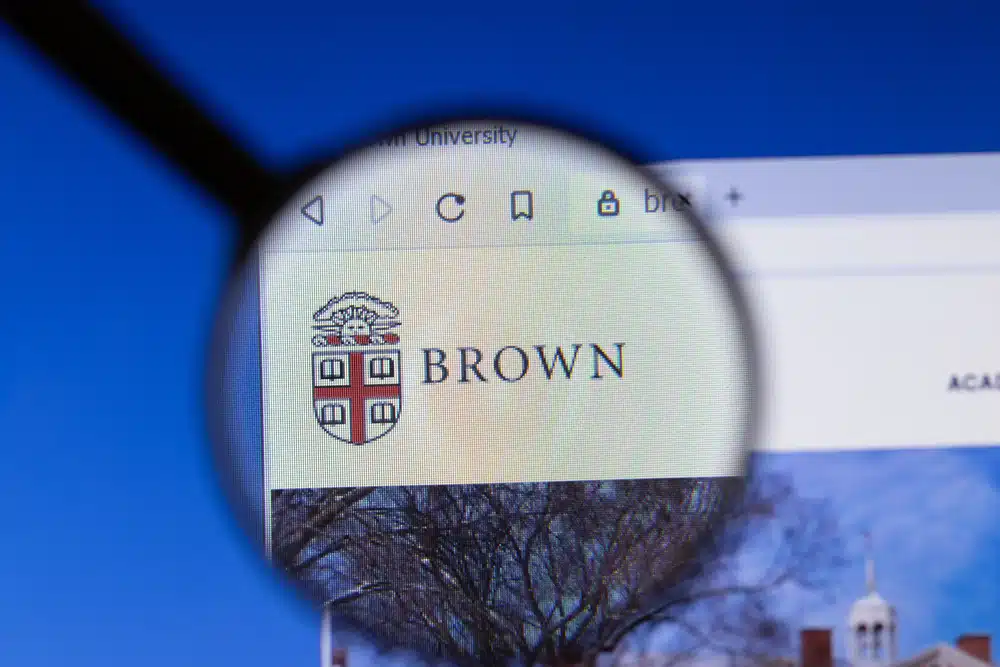Accepted to Brown: Now What?
For students who are looking to reap the benefits of an Ivy League education – both in terms of the education itself as well as the opportunities that being part of such an elite community can provide after graduation – but still want to learn in a more liberal arts style of education, one of the best choices available is Brown University.What do you need to do after being accepted to Brown?
Brown is one of the most competitive and prestigious schools in the United States, and it focuses on offering students an intimate and unique undergraduate experience. For a lot of schools, getting accepted to Brown is a dream come true! But simply getting into Brown is not the end of any student’s journey. In fact, in a lot of ways, getting accepted to Brown is just the beginning.
There are a lot of important steps and bits of information that students should know in terms of what to do after getting accepted to Brown.
At AdmissionSight, we work with intelligent and highly driven high school students each and every application cycle. Though we do offer counseling and tutoring to students for their high school curriculum, ACT or SAT prep, and much more, the most common jobs that we are called on to help students revolve around the application process itself.
That means identifying schools that are the best fits, filling out the application itself, gathering letters of recommendation, writing personal statements and school-specific essays, etc. Thanks to our years of experience within this highly competitive environment, AdmissionSight has developed unique strategies and tools that can help students accentuate their strengths, overcome their weaknesses and get into some of the most selective schools in the United States, such as Brown.
That is why we are so proud of the fact that 75 percent of the students that we work with go on to either get into an Ivy League school such as Brown, Harvard or Yale or a top-10 school elsewhere in the country like MIT, Stanford or CalTech.
So, if you are curious what to do after getting accepted to Brown or simply want to learn a bit more about how the Browns admissions work and what the admissions officers at this school look for specifically in the students that apply, then you have come to the right place.
Let’s break all that information and more down together.
How Brown admissions works
Before we get into what a student should start focusing on when they get into Brown, we wanted to break down some of the most important things that the admissions officers themselves will look at on your application during the admissions process.
While every school operates a bit differently when it comes to admissions, all eight Ivy League schools do tend to have pretty similar expectations and values. Before we go further, it is important that while Brown’s admissions certainly have a high level of expectation from its applicants, the admissions officers at the school are not looking for one kind of student specifically.
The admissions process is completely holistic, which means that all information a student provides as part of their application will be considered. Above all, admissions officers are looking for students who are passionate about their education and who seem determined to be a positive and impactful force within the Brown University community.
With all that out of the way, let’s get into some of the specific factors that admissions officers at Brown will consider within a student’s application to the school.
Are you familiar with the school?
While this is not entirely important at many less competitive schools in the United States, the most selective schools (including all of the Ivy League schools) do want to see that the students applying to their school are familiar with the legacy and culture of the school itself. Brown admissions officers want to find students who are driven and who want to attend Brown specifically for what it has to offer its students, both inside and outside of the classroom.
For that reason, you are going to want to spend some time within your application making it clear that you have a real knowledge of what the school has to offer its students and why you think you would be such a great fit there.
How do your grade point average and test scores compare?
As you likely already know, one of the most important indicators of a student’s general chances of getting into a highly prestigious school such as Brown is going to be their high school grade point average. While schools have a minimum GPA requirement is certainly not the norm in the United States, the admissions officers themselves do have a certain level of success that they expect out of applicants.
The primary reason for this is because success in a high school curriculum is the best way to predict success at the undergraduate level. Getting as close to an unweighted GPA of 4.0 should be any student’s goal if they are truly determined to get into a school as selective as Brown.
Beyond this, students should make sure that they are able to enroll in a fair amount of advanced placement or honors classes during high school so that they can prove to admissions officers at Brown that they are able to handle difficult material and a competitive classroom environment.
Beyond just your GPA, you will also want to make sure that your SAT or ACT scores also reflect well upon you. While Brown is a test optional school at the moment, it is important to note that a fair amount of Ivy League applicants are still taking either the SAT or ACT because they can help improve a student’s chances of getting in. If you plan on taking one or the other, make sure that you know what kind of score should be your target if you plan on getting into Brown.
Do you have clear objectives and direction?
Another really important factor that admissions officers at Brown will look for during the admissions process are students that have clear objectives for their future and a sense of direction in life. And this does not mean students who simply have the objective of getting into Brown. That is not nearly enough.
Admissions officers want to see in a student’s application proof that they have a real plan when it comes to what great things they want to accomplish in their undergraduate education and beyond. Where do you see yourself academically and professionally in the years ahead? What is your plan to accomplish your lofty goals?
This is not to say that the admissions officers at Brown expect you to be able to predict your future or even know exactly what you want to do, but there should be a sense that you have big plans for what lies ahead of you.
After all, part of the prestige that the Ivy League holds has to do with the impressive things that Ivy League graduates go on to accomplish following their education. If Brown feels confident that you will go on to accomplish great things, it figures to only improve your chances of getting in.
Are you able to stand out from the crowd?
When it comes to getting into any of the top schools in the United States, one of the major strategies that we pass onto the students that we work with is finding ways to stand out from the crowd and make it clear that there are things that make you truly unique compared to the majority of the students applying to these kinds of schools.
While factors like having great grades and SAT or ACT scores are important, when it comes to getting into Ivy League schools, those kinds of factors should really more be seen as prerequisites to even be considered as opposed to things that are going to get you in on their own.
So, when you are writing your personal statements or taking part in the school’s applicant interview process make sure to clarify the following:
- What kind of environment and culture did you grow up in?
- How have your experiences shaped you and your point of view?
- What are your niche interests?
- How do you plan on impacting your community and the world around you?
Why you do not necessarily have to come from a unique background, you do want to go out of way to prove that the way that you see the world and interact with the people around you will offer a fresh new point of view to the Brown campus and community.
Things to do after getting into Brown
So, now that you have a better idea of what admissions officers at Brown are going to look for during the admissions process at the school, let’s jump ahead to what is going to happen and what you want to focus on once you do end up actually getting into this fantastic school!
Keep in mind that now that the 2021-22 application cycle is finished and the incoming class of 2026 has been settled, Brown officially just went through its most competitive admission cycle in the history of the school The school had an overall acceptance rate of just 5.0 percent, with an Early Decision acceptance rate of 10.31 percent and a Regular Decision acceptance rate of just 3.6 percent!
All that to say: If you have just been accepted to Brown and want to learn more about what to do, congrats! You have done something truly unique and accomplished something that not many other students can say they have accomplished.
So, what now? Here are some things to keep in mind.
You’ll want to close the loop on your academic records
One important thing to take note of is that first-year students are going to want to make sure that their high school counselors will submit your Final School Report and Final transcript by the June 24 deadline. Brown wants to make sure that you keep up with your education in your senior year. So, make sure not to slack off in the second semester of your senior year, because Brown will be seeing all of your grades!
If you self-reported test scores, send in your official scores
While Brown does allow applicants to self-report their SAT or ACT scores, you are going to have to send in your official scores in the event that you are accepted to the school.
To do so, students must simply contact the College Board, American College Testing Service, IELTS, and ETS for TOEFL to have your scores released and sent to Brown. Scores must be sent directly from these sources; Brown cannot accept score reports from you or your high school counselor.
Notify other schools of your decision to attend Brown
While no deposit is required for students to hold their place in the incoming class at Brown, students will want to make sure that they have notified the other schools that they were accepted to their plans to attend Brown.
Prepare for orientation
For first-year students, make sure to get ready for your First Year Movie In on August 31st and your New Student Orientation from September 1st to September 6th.
What else to know about Brown
Beyond the basic requirements that you want to make sure you fulfill if you get accepted to Brown, you are going to want to know some of the most important facts about actually attending Brown as an undergraduate student. Ideally, if Brown is near the top of your list of dream schools, you will already have a pretty good idea of what you can expect as a student at Brown.
In case you have not yet done a whole lot of research on the subject, we thought we would break down some of the more important facts about what it’s like to actually attend Brown.
Brown’s open curriculum is truly unique
At a lot of schools across the country, freshman students are expected to enroll in a core list of classes. These classes are required, and while they can absolutely help a student gain a more varied education, it can also get in the way of students being able to take the kinds of classes that they really want to invest their time, energy and money into.
Brown’s open curriculum is quite different from that norm, as students are free to explore the many different majors and subjects. Students are not restricted by any kind of core curriculum that they have to take in order to graduate.
With that in mind, there are still requirements that students at Brown do need to fulfill:
- You have to sign up for at least 30 courses within an eight-semester period.
- You have to choose a concentration.
- You must show proficiency in English.
The student body is very diverse
If there is one thing that the Ivy League has shown clear interest in improving over the last decade or so is its diversity. For much of its history, the Ivy League was pretty much only a real option for wealthy, white individuals. For obvious reasons, the schools have worked hard to open up the Ivy League to a much more diverse group of people. When it comes to Brown, this school may be the most diverse in the Ivy League at the moment.
Undergraduate students come from over 100 different countries all around the world, and Brown’s ethnic diversity is not only one of the highest in the Ivy League, but also one of the highest in schools across the United States.
As a result, students have much better chances of meeting people from different countries, cultures and socio-economic backgrounds and learning important lessons from them!
The campus makes getting around really easy
For a lot of undergraduate students, there can be a bit of culture shock involved in enrolling at a big college or university. Whether you enroll in a state school with thousands of students per class, or a different Ivy League school in the heart of a city like Boston or New York, the size and scope of everything around you can be quite overwhelming.
For students at Brown, the school has made it a major point to keep the size of classes and the size of the physical campus manageable. Brown strikes a perfect balance of having a fair amount of students (approx.. 9,000) and enough space, while also not being overwhelming. Classes are often less than 20 people, and groups and clubs allow room for students to really grow and take on roles of leadership!
Congrats on your Brown admission!
Getting into Brown is one of the hardest things a student applying to colleges and universities can do! For that reason, it is absolutely a time to celebrate and look forward to your future education. However, the work is far from over!
If you are interested in learning more about what to do once you get in, or simply want to figure out how to best improve your chances of getting accepted to Brown, contact AdmissionSight today to schedule a free consultation.










































